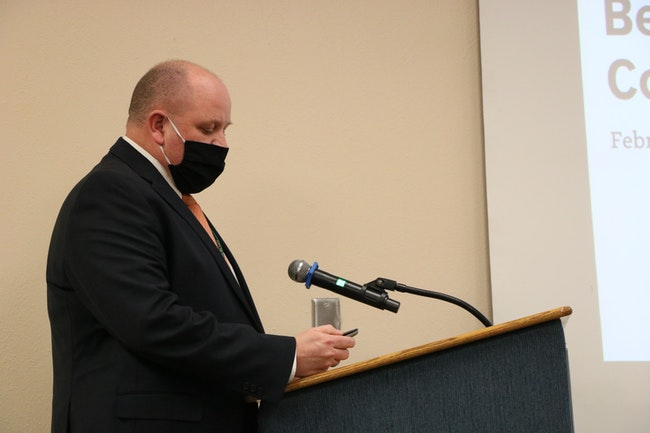
Adam Brown, Ontario city manager, at a recent city council meeting. (Liliana Frankel/The Enterprise)
ONTARIO – A new lobbyist will be heading to Salem on behalf of the city of Ontario.
The Ontario City Council voted Thursday to allot $20,000 towards promoting legislation that would increase the amount of tax the city collects on its marijuana sales.
Voting yes on the measure were Councilors Freddy Rodriguez, Sam Baker, Michael Braden, John Kirby, and Ken Hart. Mayor Riley Hill wasn’t present, but he has been a vocal proponent of increasing taxes on marijuana.
Despite its small size and rural character, Malheur County, whose dispensaries are concentrated in Ontario, consistently ranks third in marijuana sales statewide, just behind Portland-area counties.
Ontario saw $9.5 million in sales in January alone. It assesses a 3% sales tax on that revenue, and the state collects an additional 17%. The state then allocates 10% of its marijuana tax collection back to cities, but it does so based on a formula relating to a city’s population, not the amount of marijuana sold in a particular community.
Ontario, as a border city whose dispensaries serve a large proportion of Idahoans, is at a disadvantage. It attracts customers from across the Boise area, but its official population is small.
That means that right now, Ontario sends about $1.7 million a year to Salem, but get backs only 3% of that.
House Bill 2014 would change the state formula so that the share of money some cities receive would be based on sales of marijuana rather than their population. This would likely mean an increase of funds for Ontario. The money redistributed to Ontario by the state of Oregon, currently about $55,000 a year, has to be spent on public safety.
The only uncertainty is that state revenue from marijuana was recently capped at $11.25 million per quarter by Ballot Measure 110, better known for decriminalizing possession of most drugs in Oregon. All revenue in excess of that number will now go to the Drug Treatment and Recovery Services Fund.
Ontario City Manager Adam Brown estimated that with the cap in place, the amount of money available for redistribution to cities would be effectively reduced by 75%.
“In reality, what the government did was defund the police, because that money was for public safety,” said Ontario City Manager Adam Brown.
House Bill 2015, meanwhile, would allow Ontario to raise the local tax from 3% to 10%.
According to research conducted by Brown, legal marijuana is a relatively “inelastic” product, meaning that even if its price should rise, users will continue to buy at about the same rate. Brown said that as such, the city of Ontario has plenty of room to raise taxes without worrying that those taxes will depress sales.
The money that Ontario collects through the 3% sales tax, currently about $3 million a year, is spent mostly on one-time costs such as buildings, parks, and other improvements, code enforcement, and retirement debt.
Brown estimated that a 10% local tax would give the city around $10 million a year.
The $20,000 that the city has moved to spend on a lobbyist will come from the city’s general fund.
“Lobbyists in Salem will know who the influencers are, the mavens,” said Brown, explaining why the investment is worthwhile.
Two years ago, Brown went to Salem with Mayor Riley Hill to advocate for a tax change, but they were unsuccessful.
Brown said that he would consider asking city officials in Portland to collaborate in funding the lobbyist, since the legislation would benefit them as well.
The councilors expressed their support for Brown in looking for partnerships to help fund the lobbyist.
“Having a partner would help out,” said Rodriguez.
News tip? Contact reporter Liliana Frankel at [email protected] or 267-981-5577.
YOU CAN SUPPORT THIS KIND OF WORK
The Enterprise relies on community support to fund vital local journalism. You can help us do more.
SUBSCRIBE: A monthly digital subscription is $5 a month.
GIFT: Give someone you know a subscription.
ONE-TIME PAYMENT: Contribute, knowing your support goes towards more local journalism you can trust.




